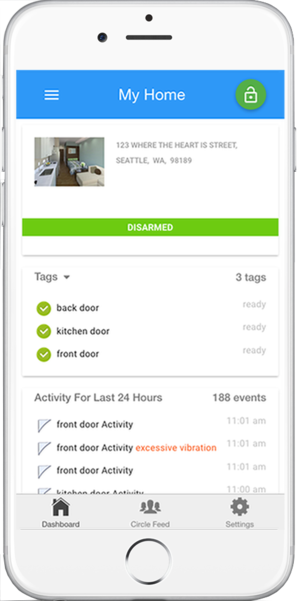
Smart homes get smart security from Korner
How engineer, Steve Hollis, is making homes smarter and more secure using low cost sensors connected to smartphones

How engineer, Steve Hollis, is making homes smarter and more secure using low cost sensors connected to smartphones
By Angela Pause Faculty of Engineering One of the things driving the Internet of Things and the smart home is the rapidly declining cost of technology. With more smartphones than people on the planet, high volume production has led to commodity pricing on components such as sensors. To an engineer with entrepreneurial leanings this means one thing: opportunity.
One of the things driving the Internet of Things and the smart home is the rapidly declining cost of technology. With more smartphones than people on the planet, high volume production has led to commodity pricing on components such as sensors. To an engineer with entrepreneurial leanings this means one thing: opportunity.
In 2013, Steve Hollis (BASc 1991, Mechanical), was just another smart engineer working in Silicon Valley. Whenever he and his engineer buddies would get together they would toss around ideas about what could be done with such newly affordable technology. But it wasn’t until he and his then girlfriend (now wife) were visiting some friends with a new baby that did he discovered his “aha” idea.
 “Our friends had been shopping for a home security system but everything was way too expensive - and this was a dual income couple!” says Hollis. “It really struck me that right there was a need for inexpensive home security, and with advances in App and sensor technology there was a better and easier way to do it.”
“Our friends had been shopping for a home security system but everything was way too expensive - and this was a dual income couple!” says Hollis. “It really struck me that right there was a need for inexpensive home security, and with advances in App and sensor technology there was a better and easier way to do it.”
That idea, along with low cost sensors, ubiquitous smart phones and engineering talent would see Hollis ultimately founding Korner, a DIY home security system. At less than $100 for a kit that takes only minutes to install, Hollis has created a noticeable disruption in the home security industry.
What makes the Korner system unique is that it is comprised of one-piece door and window sensors that when triggered will signal a siren to scare away burglars, while alerting your mobile phone to the incident. Users can forward alerts to friends, family and neighbors, creating a neighbourhood watch community through technology. Arming and disarming the Korner system is done through a smartphone so it can be automatically scheduled, says Hollis.
With initial funding from a $420,000 Indiegogo campaign (which they have delivered on) and some viral television news coverage of a burglary attempt thwarted by the Korner system, Hollis now sells Korner internationally and it’s available on Amazon in the US and UK.

Read more
Redefining capstone learning by bringing students, faculty and community partners together to tackle real-world challenges

Read more
Here are the people and events behind some of this year’s most compelling Waterloo stories

Read more
From transforming solutions for homeownership to advancing health care interventions, Waterloo talent continues to disrupt industries and drive change
The University of Waterloo acknowledges that much of our work takes place on the traditional territory of the Neutral, Anishinaabeg, and Haudenosaunee peoples. Our main campus is situated on the Haldimand Tract, the land granted to the Six Nations that includes six miles on each side of the Grand River. Our active work toward reconciliation takes place across our campuses through research, learning, teaching, and community building, and is co-ordinated within the Office of Indigenous Relations.